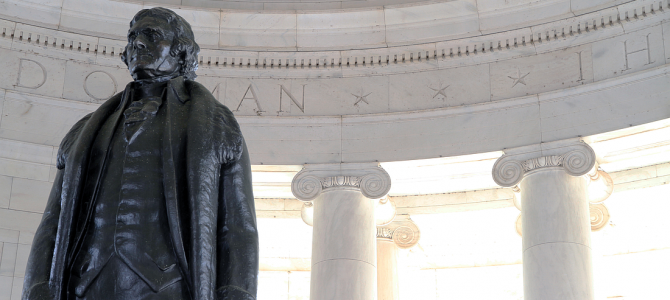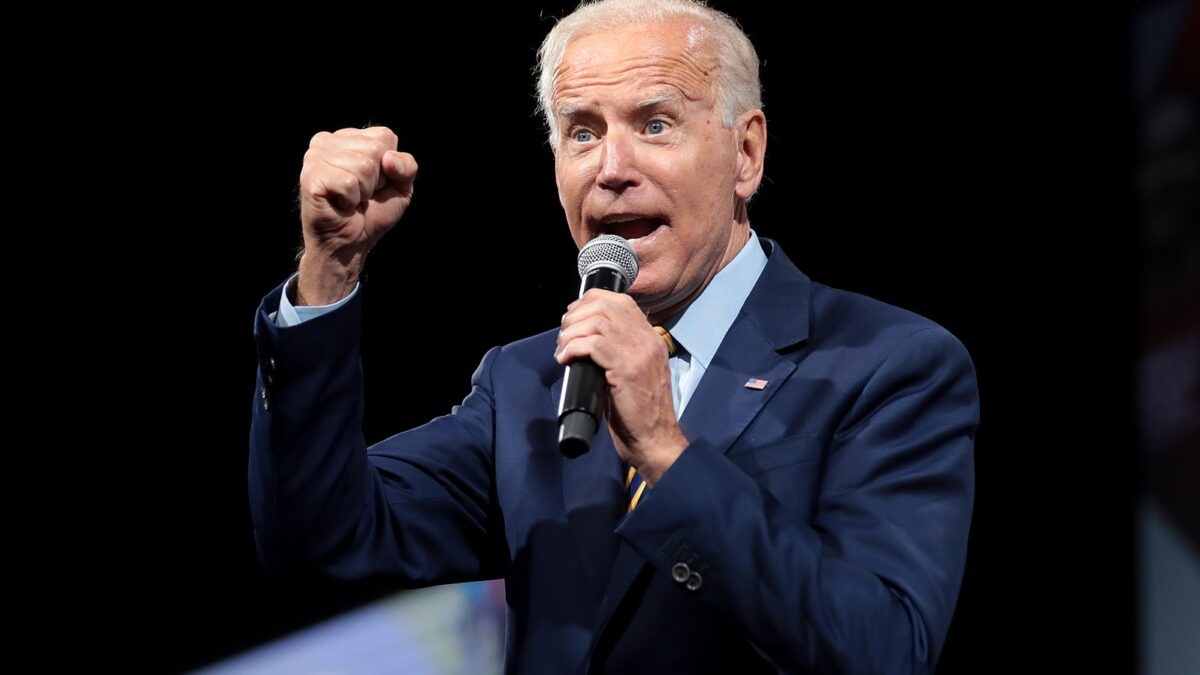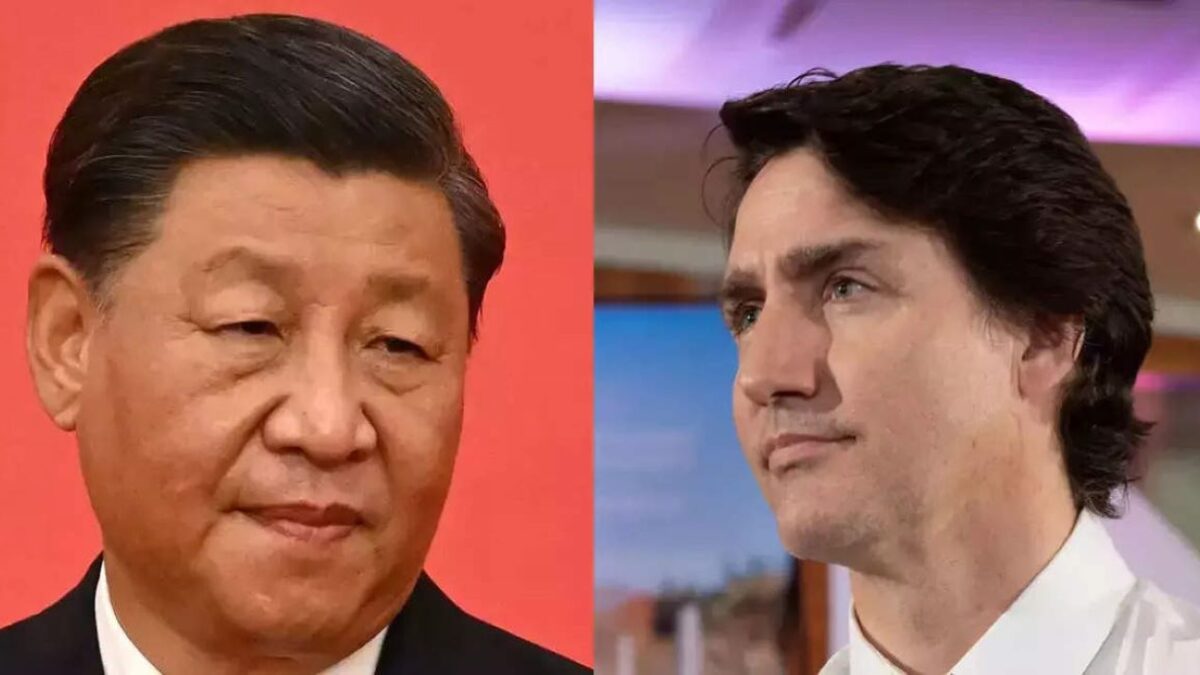
The 2016 election has often been compared to the election of 1800, in which the populist Democratic-Republican candidate, Thomas Jefferson, defeated the “establishment” Federalist candidate, John Adams. It was the “mobocrats” against the “monocrats”—an election fraught with as much rancor, division, personal attacks, and animosity as the contest between Donald Trump and Hillary Clinton.
“No person who was not a witness of the scenes of that gloomy period can form any idea of the afflicting persecutions and personal indignities we had to brook,” Jefferson later wrote of his battle with the Federalists.
Given the similarities of the two elections, it would be beneficial to both President-elect Donald Trump and the American people to hear from the man who faced the daunting task of restoring unity to a divided country, reestablishing principles of liberty to a government that had expanded beyond its constitutional boundaries and had lost the trust of the American people.
What We Can Learn From Thomas Jefferson
In his First Inaugural Address in 1801, Jefferson laid out his principles of governing and declared that his primary task was the “happiness and freedom of all.” He recognized that the election had been a contentious one and that the divisions were deep. But he saw his role not as one that spurred further division, but one that sought unity and goodwill.
This was a task he undertook with great humility, as he considered his own weaknesses in light of the “greatness of the charge” to which he had been entrusted. The speech Jefferson gave and the principles he held (aside from an extremely reduced military, which wouldn’t be prudent today) would be a worthy guide in the days and years ahead.
With the election behind him, Jefferson reminded the American people that they must look forward and leave the discord of the political contest behind them. The election “being now decided by the voice of the nation, announced according to the rules of the Constitution, all will, of course arrange themselves under the will of the law, and unite in common efforts for the common good.” The majority had spoken, and the Democratic-Republicans had won, but Jefferson did not see that as license to ignore those entrusted to his oversight. The minority still “possess their equal rights, which equal law must protect, and to violate would be oppression.”
Jefferson Called for Unity and Respect. We Need That, Too
Having comforted every American that their rights would be honored, he called for all to “unite with one heart and one mind” and “to restore to social intercourse that harmony and affection without which liberty and even life itself are but dreary things.”
Jefferson’s counsel is much needed in these turbulent times. As we contemplate the state of public discourse today, we find it is mostly driven by bitterness and fear, not harmony and affection—a dark and destructive state of mind that is buttressed by distrust. We speak often of the loss of trust in our political institutions, something that was of primary relevance in the 2016 election. But what is truly troubling and a real threat to liberty is the breakdown of trust among citizens for one another. This loss inevitably leads to a disintegration of affection and respect, which in turn degenerates into contempt.
Jefferson saw the dangers of this and sought to restore unity. He reminded the American people that “every difference of opinion is not a difference of principle.” He also addressed the fact that there were those in the electorate and political class who did not believe in the republican form of government, that it couldn’t be “strong” or that limited government is not “strong enough.” But, he said, “would the honest patriot, in the full tide of successful experiment, abandon a government which has so far kept us free and firm on the theoretic and visionary fear that this Government, the world’s best hope, may by possibility want energy to preserve itself? I trust not.”
We Need Government Reform More Than Ever
The same could be said today. Those who want to expand government power have ignored the fact that it is the republican system of government that has preserved freedom for the individual. Fundamental transformation of that system would be a fool’s endeavor. If you want liberty, if you want your rights protected, if you want to be treated equally before the law, then maintaining the republican form of government is the best and only way.
Today’s system, riddled with corruption and deceit, must be changed through reform, not transformation. This was a point Edmund Burke made even as he recognized that “a state without the means of some change is without the means of its conservation.”
Change is novelty. And whether it is to operate any one of the effects of reformation at all, or whether it may not contradict the very principle upon which reformation is desired, cannot be known beforehand. Reform is not change in the substance or in the primary modification of the object, but a direct application of a remedy to the grievance complained of.
What Jefferson’s Populism Looked Like
Jefferson wanted change through reform. Even in revolution there would not be transformation, but conservation. He wanted what was best for the people, not for the politicians who lusted after power. This is why he was the “people’s president”: standing athwart those who wanted to strengthen the power of the establishment and expand the federal government. He wanted to cut down Leviathan, not feed it. Freedom and liberty rested in self-government, the sovereignty of the states, and local governance—not in Washington. This is what Jefferson’s “populism” looked like.
Even in Jefferson’s day, federal institutions had grown too quickly, threatening the welfare of the populace—a metamorphosis Jefferson observed with deep concern. In 1798, he wrote, “It is a singular phenomenon that while our State governments are the very best in the world, without exception of comparison, our General Government has, in the rapid course of nine or ten years, become more arbitrary and has swallowed more of the public liberty than even that of England.” I shudder to think what Jefferson would say of it today.
If Jefferson has one message for our elected officials, it is to secure the freedom and happiness of the people by reducing the size of government and restoring republican principles. “It is not by the consolidation, or concentration of powers, but by their distribution, that good government is effected,” Jefferson wrote. “It is by this partition of cares, descending in gradation from general to particular, that the mass of human affairs may be best managed, for the good and prosperity of all.”
We Must Be Wary of Federal Government Power
Jefferson never wanted to see offices and duties that were best left to the states “transferred to Washington, where, further withdrawn from the eyes of the people, they may more secretly be bought and sold as at market.”
Our country is too large to have all its affairs directed by a single government. Public servants at such a distance, and away from the eye of their constituents, must, from the circumstance of distance, be unable to administer and overlook all the details necessary for the good government of the citizens; and the same circumstance, by rendering detection impossible to their constituents, will invite the public agents to corruption, plunder and waste.
Indeed, this is what we have: a public sector riddled and stained by corruption, plunder, and waste. Jefferson was strict in his commitment to republicanism and the division of powers (though in practice, even he had to contend with compromises at certain points). Yet, he aspired to be a steadfast adherent not to public opinion or ideology, but to the Constitution, which he described as the “ark of our safety, and grand palladium of our peace and happiness.”
The true theory of our Constitution is surely the wisest and best, that the States are independent as to everything within themselves, and united as to everything respecting foreign affairs. Let the General Government be reduced to foreign concerns only, and let our affairs be disentangled from those of all other nations, except as to commerce, which the merchants will manage the better, the more they are left free to manage for themselves, and our General Government may be reduced to a very simple organization, and a very inexpensive one; a few plain duties to be performed by a few servants.
Jefferson’s Administration Sought to Foster a ‘Quiet’ Path
After taking office, Jefferson took pride in the fact that the federal government wasn’t busy “getting things done.” In 1802, he wrote. “The path we have to pursue is so quiet that we have nothing scarcely to propose to our Legislature. A noiseless course, not meddling with the affairs of others, unattractive of notice, is a mark that society is going on in happiness.”
Jefferson was keenly aware that his political enemies, who loved big government, would not be kind to him and that they would question his true principles as he traversed the rough waters of politics. In a preemptive step to establish his principles and purposes, he wrote in 1799:
In confutation of all future calumnies, by way of anticipation, I shall make you a profession of my political faith: in confidence that you will consider every future imputation on me of a contrary complexion as bearing on its front the mark of falsity and calumny. I do then with sincere zeal, wish an inviolable preservation of our Federal Constitution, according to the true sense in which it was adopted by the States: that in which it was advocated by its friends, and not that which its enemies apprehended, who therefore became its enemies.
If We Want Liberty, We Should Honor the Constitution
If we want liberty, if we want our rights protected, if we want prosperity and happiness, we would do well to heed our third president, who, probably more than any other, honored the Constitution, fought for limited government, and respected the rights of the individual.
Let us, then, with courage and confidence pursue our own Federal and Republican principles, our attachment to union and representative government. …entertaining a due sense of our equal right to the use of our own faculties, to the acquisitions of our own industry, to honor and confidence from our fellow-citizens, resulting not from birth, but from our actions and their sense of them; enlightened by a benign religion, professed, indeed, and practiced in various forms, yet all of them inculcating honesty, truth, temperance, gratitude, and the love of man; acknowledging and adoring an overruling Providence, which by all its dispensations proves that it delights in the happiness of man here and his greater happiness hereafter—with all these blessings, what more is necessary to make us a happy and a prosperous people?
“Still one thing more,” Jefferson wrote, “—a wise and frugal Government, which shall restrain men from injuring one another, shall leave them otherwise free to regulate their own pursuits of industry and improvement, and shall not take from the mouth of labor the bread it has earned. This is the sum of good government.”
What We Can Learn From Jefferson’s ‘Essential Principles’
Jefferson had many critics, most of whom condemned his administration as a failure and a threat to the country before he even stepped in office. At one point, Jefferson wrote to William Jackson, “I have received many letters stating to me in the spirit of prophecy, caricatures which the writers, it seems, know are to be the principles of my administration. To these no answer has been given because the prejudiced spirit in which they have been written proved the writers not in a state of mind to yield to truth or reason.”
It was important to Jefferson that the American citizens, not the skeptics, were confident in his ability to lead and in the principles he held. “In a government like ours it is necessary to embrace in its administration as great a mass of confidence as possible.” Jefferson believed he achieved that, writing to James Madison, “If ever the earth has beheld a system of administration conducted with a single and steadfast eye to the general interest and happiness of those committed to it, one which, protected by truth, can never know reproach, it is that to which our lives have been devoted.”
The “essential principles” on which he established his administration were rooted in his commitment to the Constitution and republicanism. These he outlined specifically in his first inaugural address:
Equal and exact justice to all men, of whatever state or persuasion, religious or political;
peace, commerce, and honest friendship with all nations, entangling alliances with none;
the support of the State governments in all their rights, as the most competent administrations for our domestic concerns and the surest bulwarks against anti-republican tendencies;
the preservation of the General Government in its whole constitutional vigor, as the sheet anchor of our peace at home and safety abroad;
a jealous care of the right of election by the people—a mild and safe corrective of abuses which are lopped by the sword of revolution where peaceable remedies are unprovided;
absolute acquiescence in the decisions of the majority, the vital principle of republics, from which is no appeal but to force, the vital principle and immediate parent of despotism;
a well-disciplined militia, our best reliance in peace and for the first moments of war till regulars may relieve them;
the supremacy of the civil over the military authority;
economy in the public expense, that labor may be lightly burthened;
the honest payment of our debts and sacred preservation of the public faith;
encouragement of agriculture, and of commerce as its handmaid;
the diffusion of information and arraignment of all abuses at the bar of the public reason; freedom of religion; freedom of the press, and freedom of person under the protection of the habeas corpus, and trial by juries impartially selected.
“These principles form the bright constellation which has gone before us and guided our steps through an age of revolution and reformation,” Jefferson said.
What About Jefferson’s Weaknesses And Faults?
Citing Jefferson will, of course, bring out the naysayers. These will inevitably say, “But his words and his so-called ‘principles’ are stained with racism and delegitimized because he was a slave owner.” They will scoff at mention of the man who penned, “We hold these truths to be self-evident, that all men are created equal, that they are endowed by their Creator with certain unalienable Rights, that among these are Life, Liberty, and the pursuit of Happiness.”
To these I simply quote Abraham Lincoln:
The principles of Jefferson are the definitions and axioms of free society. . . . All honor to Jefferson—to the man, who in the concrete presence of a struggle for national independence by a single people, had the coolness, forecaste, and sagacity to introduce into a merely revolutionary document an abstract truth, applicable to all men and all times, and so embalm it there that today and in all coming days it shall be a rebuke and a stumbling block to the very harbingers of reappearing tyranny and oppression.
Hopefully Trump Will Follow Jefferson’s Example
Jefferson loved liberty. He believed it was given to all men, not by government, but by God. The country he helped build was founded on this love and this belief. He saw it as a treasure to be protected, a first love not to be forgotten. He put no other loyalties before it, writing as president, “The first objective of my heart is my country. In that is embarked my family, my fortune and my own experience.”
Jefferson’s commitment was not to his own interests, those of politicians or other nations, but to the American people. Their freedom and their happiness was his most solemn responsibility and his first priority. “The will of the people,” Jefferson wrote, “is the only legitimate foundation of any government, and to protect its free expression should be our first object.”
May it be the first object for this administration, as it has been empowered by the people, not to secure its own supremacy, ideology, or legacy, but to secure the true rights of Life, Liberty, and the pursuit of Happiness for every American.







